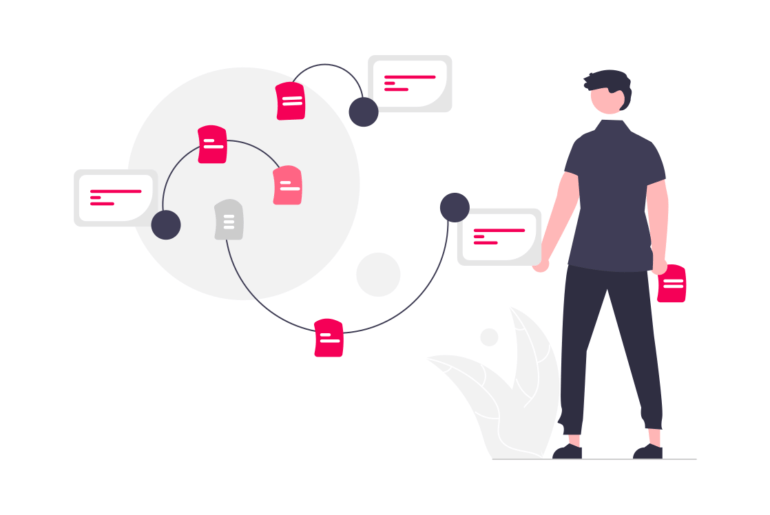Learn about Universal ID, a unique identifier that can assist publishers in the post-cookie world. Discover its benefits, types, and how it enables recognition and authentication of users across platforms, aiding in personalized content delivery.
As the traditional methods of tracking and targeting users become more restricted, finding alternative solutions is crucial. Publishers were already on their way to getting grips with the aftermath of GDPR, and a bigger threat to the existence of cookies emerged. For a while now, browsers have been launching a crusade against third-party cookies.
First, it was Safari with its Intelligent Tracking Prevention (ITP), then Chrome announced that it will block third-party cookies completely by 2023, and most recently, Firefox started blocking cookies by default. Together, those three browsers control the majority of the market share. The rest is taken by privacy-focused browsers such as Brave, Epic, and Iridium. Due to this, the industry is looking for a solution for effective advertising without the use of third-party cookies.
One such solution that holds promise is the concept of Universal ID. A Universal ID is a unique identifier that allows publishers to recognize and authenticate users across platforms, providing a more holistic view of their audience.
In this article, we will explore the concept of Universal ID and delve into how it can potentially assist publishers in navigating the post-cookie era, enabling them to continue delivering personalized and relevant content to their audiences.
But first, let’s understand what Universal ID is.
What is a Universal ID?
Introduced as a response to the growing challenges in digital advertising caused by fragmented user data, particularly due to third-party cookies, Universal ID provides a reliable solution.
Universal ID is a unique identifier used in digital advertising to keep track of users across different devices and platforms. It provides a way to recognize individuals consistently, even when they switch between devices like smartphones, tablets, or computers.
Also Read – What Are Cookies? Different Types of Web Cookies, Explained
Why Should Universal IDs Replace Third-Party Cookies?
The privacy of users is increasingly becoming a concern in the industry as third-party cookies are considered an invasion of privacy. Universal ID makes for a great solution to help solve this issue. These Universal IDs form a shared user identity in the supply chain. They are focused on respecting users’ privacy as it comes with a first-party-based solution.
With their focus on privacy and seamless integration, these identifiers (universal IDs) pave the way for a future where personalized and contextually fitting web experiences take center stage. By embracing this paradigm shift, publishers, advertisers, and users collectively forge a more secure and privacy-conscious digital ecosystem.
Life After Cookies with Universal IDs
What happens when using third-party cookies becomes untenable? As mentioned earlier, one solution that is catching everyone’s attention revolves around the idea of Universal ID—a framework for user identification based on deterministic matching (as opposed to probabilistic matching with cookies).
Deterministic matching means the ability to accurately identify a user across multiple platforms and devices, without duplication.
Many ad tech companies and trade groups are building Universal ID solutions. This has fueled a format war to see who grabs the biggest market share. The good news is that the solutions play well with each other.
By implementing Universal IDs, publishers can maintain audience targeting capabilities, deliver personalized content, and optimize ad campaigns without relying on cookies. This shift opens up opportunities for improved user experiences, better data privacy, and more effective advertising strategies in a cookie-less future.
Let’s delve deeper and have a close look to the benefits of universal IDs.
Also Read – Third-Party Cookies Alternatives: 7 Best Choices for Publishers
Publishers’ Benefits of Using Universal ID
The emergence of Universal ID may actually be a blessing in disguise for web publishers. This is because cookie-syncing with multiple partners is a flawed system that has many problems related to privacy, speed, and efficiency. Here are the benefits of switching over to Universal ID.
Immunity against cookie blocking
Since user identification and tracking happens by creating a deterministic match via universal ID, publishers don’t need to rely on third-party cookies anymore—and so, it doesn’t matter if they’re blocked by browsers.
Better user match rates
Unlike cookies, universal IDs work seamlessly across multiple devices such as desktop, tablet, and mobile devices. Some providers promise a near 100% accuracy rate in matching user identities when using their solution.
Improved revenue potential
Better user matching rates mean that advertisers will be willing to pay more for the same inventory. Generally speaking, the more certain an advertiser is about the identity of a particular user, the higher they are likely to bid.
Better UX and viewability
Cookie-syncing, in its current state, requires callouts to multiple partners for optimizing match rate—increasing page latency. Universal ID may have a positive impact on ad viewability and UX by eliminating that process.
Most Popular Universal ID Solutions
In the realm of Universal IDs, three distinct types have emerged in the market such as DigiTrust by IAB, LiveRamp, and more. These variations primarily diverge in terms of the sources they draw information from.
Certain solutions boast the flexibility to gather identity information from many sources. Let’s discuss each of them one by one.
DigiTrust by IAB
It is a non-profit, industry-wide collaboration of companies building technology solutions that improve the digital experience for consumers, publishers, and advertisers. DigiTrust has taken on the challenge of reducing the number of third-party requests on web pages, through efforts to eliminate the need for pixel synchronization. The DigiTrust technology solution creates an anonymous user token, designed to be propagated by and between its members in lieu of billions of proprietary tokens and trackers on webpages daily.
One of the best things about it is that it relies on a simplified cookie-syncing technology that introduces an expiration date to the useful lifespan of cookies. This approach ensures that user identity information remains accurate and up to date within a defined timeframe, enhancing the overall effectiveness of data synchronization.
Unified ID by theTradeDesk
As one of the largest independent demand-side platforms (DSP), theTradeDesk has one of the most ubiquitous cookie footprints in the world. They provide their proprietary cookie ID for free with their unified ID solution. By letting any other DSP, supply-side platform (SSP), data management platform (DMP), and data provider match audience data using one of the most prevalent IDs in the ecosystem, theTradeDesk provides an opportunity to scale a truly universal ID. Their solution has seen one of the fastest adoption rates.
ID5
ID5 provides a centralized cookie-matching service and a universal ID solution that publishers can leverage to operate more efficiently and to maximize the value of their inventory. Cookie matching allows publishers to monetize their audiences but also increases the risks of data leakage and GDPR defiance.
ID5’s solution helps publishers manage ID synchronizations from a centralized platform and decide which partners can and cannot synchronize cookies on their website, improve match rates with their partners and increase programmatic revenue (even where third party cookies are blocked), improve the page load time and the on-site UX, and ensure privacy and consent management across their ecosystem.
Publisher Common ID
Publisher Common ID (PubCID) is a privacy-centric first-party cookie solution. Built with consumer privacy in mind. PubCID does not sync IDs across domains so the IDs your domain generates are yours to share with whom you choose. Because the user IDs generated are site-specific, there is no degradation of these IDs over time, improving user match rates. Additionally, latency issues generally caused by multiple callouts to various parties are significantly reduced, improving user experience, viewability, and earnings.
Advertising ID Consortium
The consortium was created to enable buyers and sellers of programmatic advertising an opportunity to leverage a two-part identity framework of common cookies and people-based identifiers to create more relevant campaigns and improve user experiences.
Currently, the consortium membership includes SSPs and DSPs who represent a large share of programmatic transactions in the open web. In 2018, the consortium opened its membership to marketers and publishers to participate in shaping the consortium’s priorities.
Which universal IDs should you focus on?
When it comes to viable ad tech exchanges, consider these universal IDs that eliminate third-party data, secure personal information, and establish the best ad practices:
The Trade Desk Unified ID 2.0: This protocol offers reliable first-party cookies, audience segmentation, and privacy sandbox features. It authenticates and preserves a user’s encrypted email address, providing an alternative source of identity for targeted marketing.
LiveRamp RampID: With third-party analytics, CRM, and offline statistics, RampID assigns anonymous statuses to users across multiple channels. It optimizes personal data without relying on third-party cookies, creating an identity graph for enhanced targeting.
Publisher Common ID (PubCID): Publishers can generate trusted IDs within the advertising domain, acting as service providers. They integrate Universal ID solutions seamlessly into their websites.
Moreover, these universal IDs offer solutions for secure and effective advertising practices.
Frequently Asked Questions for Universal ID
A Universal ID is a unique identifier that allows for the creation of shared user identity across the supply chain. It enables publishers and advertising companies to provide personalized experiences while maintaining user privacy and data security.
Universal IDs aim to anonymize user data, ensuring that personal information remains protected. By moving away from third-party cookies, Universal IDs offer a more transparent and privacy-conscious approach to digital advertising.
There are plenty of benefits of Universal IDs. Here are some of them:
They enable more accurate targeting by facilitating cross-domain tracking, allowing for the delivery of tailored and contextually relevant ads across different platforms.
Next, Universal IDs enhance data security, fostering a more trustworthy and user-centric digital ecosystem.
Universal IDs streamline the user experience by providing a single identifier that can be used across multiple platforms, services, and applications.
These were a few of the benefits of universal ID.

Deepak has a keen eye for detail and a deep understanding of the ad tech landscape. Whether it’s through in-depth articles, thought-provoking insights, or compelling storytelling, he’s dedicated to helping people navigate the complex world of ad tech with the simplicity of his words.








1 Comment
What happen if we can’t use cookies from third parties as Adsense?